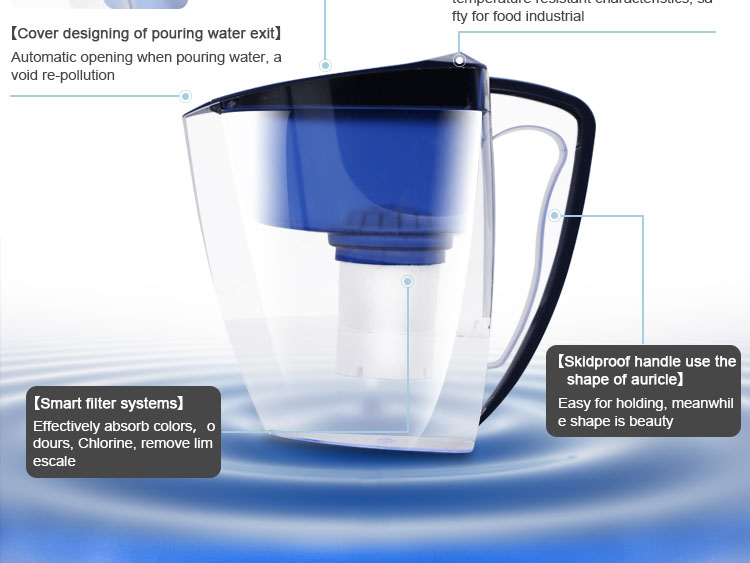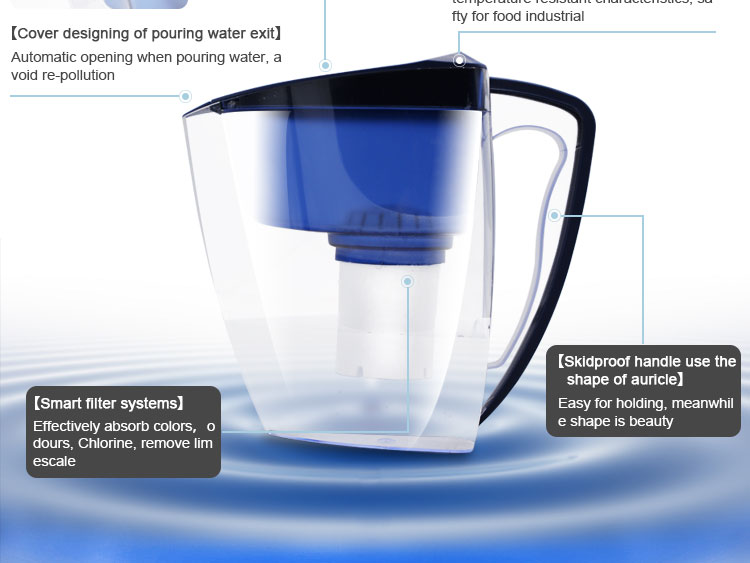Blue Technology Water Filters: Clean Water for a Better Future
Blue technology water filters are revolutionizing how we access clean water, harnessing the power of nature to create sustainable and effective filtration solutions. These innovative filters utilize a range of […]

Blue technology water filters are revolutionizing how we access clean water, harnessing the power of nature to create sustainable and effective filtration solutions. These innovative filters utilize a range of natural materials and processes to remove impurities from water, offering a more environmentally friendly alternative to traditional methods.
Blue technology filters are designed to address the growing global water crisis, providing clean and safe drinking water to communities in need. By leveraging the principles of blue technology, these filters contribute to a healthier planet and a more sustainable future.
Introduction to Blue Technology Water Filters
Blue technology is a fascinating and increasingly important field that focuses on using the ocean’s resources and processes to solve global challenges. One of its most promising applications is in water filtration. Blue technology water filters utilize natural processes and materials found in the ocean to purify water, offering a sustainable and environmentally friendly alternative to traditional methods.
Environmental Benefits of Blue Technology Water Filters
Blue technology water filters provide a range of environmental benefits compared to traditional water filtration systems. They often rely on renewable resources and minimize the use of energy-intensive processes, reducing their carbon footprint. For instance, some filters utilize bio-based materials derived from algae or other marine organisms, which are naturally abundant and can be sustainably harvested.
Types of Blue Technology Water Filters
Blue technology water filters encompass a variety of innovative approaches, each with its own unique advantages. Here are some examples:
- Bio-based filters: These filters use materials derived from marine organisms, such as algae, seaweed, or shellfish. These materials have natural filtration properties and can effectively remove contaminants like heavy metals, pesticides, and bacteria.
- Membrane filtration: This technology uses membranes made from materials like chitin (derived from crustacean shells) or alginate (extracted from seaweed). These membranes have tiny pores that allow water to pass through while blocking contaminants.
- Biofouling control: Biofouling, the accumulation of organisms on surfaces, is a common problem in traditional water filtration systems. Blue technology filters often employ bio-inspired coatings or materials that prevent biofouling, reducing the need for harsh chemicals and minimizing maintenance.
Benefits of Blue Technology Water Filters
Blue technology water filters offer numerous advantages that positively impact our health, the environment, and the economy. These filters utilize innovative materials and processes to deliver clean, safe, and sustainable water solutions.
Health Benefits
The use of blue technology water filters significantly improves water quality, directly benefiting our health. By removing harmful contaminants, these filters contribute to a safer and healthier lifestyle.
- Reduced risk of waterborne diseases: Blue technology filters effectively remove bacteria, viruses, and parasites, reducing the risk of waterborne diseases such as cholera, typhoid fever, and dysentery. This is especially crucial in regions with limited access to safe drinking water.
- Improved overall health: Clean water free from contaminants is essential for overall well-being. Blue technology filters remove heavy metals, pesticides, and other harmful chemicals that can negatively impact our health, leading to improved digestion, reduced risk of kidney stones, and better overall health.
- Enhanced taste and odor: Blue technology filters remove chlorine, sediment, and other impurities that can affect the taste and odor of water, making it more palatable and enjoyable to drink.
Impact on Water Quality and Environmental Sustainability
Blue technology water filters contribute to a cleaner environment and sustainable water management practices.
- Reduced water pollution: By removing contaminants before they enter waterways, blue technology filters help reduce water pollution, protecting aquatic life and preserving ecosystems. This is crucial for maintaining biodiversity and ensuring the health of our planet.
- Conservation of water resources: Blue technology filters can be used to treat wastewater, making it reusable for irrigation or other purposes. This conserves precious water resources and reduces the need for fresh water extraction, leading to a more sustainable approach to water management.
- Sustainable materials and processes: Many blue technology filters utilize sustainable materials and processes, minimizing their environmental impact throughout their lifecycle. This includes using recycled materials, reducing energy consumption during manufacturing, and minimizing waste generation.
Economic Advantages
The use of blue technology water filters offers significant economic advantages in various sectors.
- Reduced healthcare costs: By preventing waterborne diseases, blue technology filters can significantly reduce healthcare costs associated with treating these illnesses. This is especially relevant in developing countries where access to clean water is limited.
- Improved agricultural productivity: Clean water is essential for agriculture. Blue technology filters can improve crop yields by providing safe and nutrient-rich water for irrigation, leading to increased agricultural productivity and economic growth.
- Increased industrial efficiency: Blue technology filters can improve industrial processes by providing clean and reliable water for various applications. This reduces downtime, improves product quality, and enhances overall efficiency, leading to economic benefits.
Future Trends in Blue Technology Water Filtration: Blue Technology Water Filter

The field of blue technology water filtration is rapidly evolving, driven by advancements in materials science, nanotechnology, and artificial intelligence. These innovations are paving the way for more efficient, sustainable, and cost-effective water purification solutions.
Emerging Trends and Innovations, Blue technology water filter
The future of blue technology water filtration is characterized by a focus on developing solutions that are more sustainable, efficient, and adaptable to diverse water sources and contaminants. Here are some key trends:
- Advanced Membrane Technologies: Membranes play a crucial role in water filtration, and researchers are constantly developing new materials and designs. Graphene-based membranes offer exceptional permeability and resistance to fouling, while bio-inspired membranes mimic natural filtration systems for enhanced efficiency. These innovations promise to overcome the limitations of traditional membranes, leading to improved water quality and reduced energy consumption.
- Nanotechnology Applications: Nanomaterials are being explored for their unique properties in water purification. For example, nanoparticles can act as highly effective catalysts for degrading pollutants, while nano-sized membranes can filter out even the smallest contaminants. This field holds significant potential for developing targeted and highly efficient water treatment solutions.
- Integration of Artificial Intelligence: AI is revolutionizing water treatment by enabling real-time monitoring, predictive maintenance, and automated optimization of filtration processes. AI-powered systems can analyze sensor data, identify patterns, and adjust filtration parameters to maximize efficiency and minimize resource usage. This data-driven approach is leading to more intelligent and adaptive water treatment solutions.
- Hybrid Filtration Systems: Combining multiple filtration technologies, such as membrane filtration, adsorption, and biological treatment, offers a comprehensive approach to water purification. Hybrid systems can be tailored to specific water sources and contaminants, maximizing efficiency and effectiveness. This approach allows for the removal of a wider range of contaminants, including emerging pollutants that pose challenges to traditional methods.
Challenges and Opportunities
Despite the promising advancements in blue technology water filtration, several challenges remain:
- Cost and Scalability: Many innovative technologies are still in their early stages of development, and their cost-effectiveness needs to be proven at a larger scale. Scaling up production and deployment of these technologies requires significant investment and technological advancements.
- Regulation and Standardization: As new technologies emerge, clear regulatory frameworks and industry standards are crucial for ensuring safety and effectiveness. Establishing guidelines for testing, certification, and deployment of blue technology water filtration systems is essential for promoting responsible innovation and consumer confidence.
- Public Perception and Acceptance: Public awareness and understanding of blue technology water filtration are essential for widespread adoption. Educating the public about the benefits and safety of these technologies is critical to fostering trust and overcoming potential resistance.
Impact on Water Security and Global Sustainability
Blue technology water filtration has the potential to significantly impact water security and global sustainability:
- Improved Access to Safe Water: By providing efficient and affordable water purification solutions, blue technology can help address the global water crisis, particularly in regions with limited access to clean water. This can improve public health, reduce disease burden, and promote socioeconomic development.
- Reduced Water Footprint: More efficient water treatment processes can minimize water consumption and reduce the environmental impact of water use. This can contribute to sustainable water management and conservation efforts, particularly in water-scarce regions.
- Enhanced Environmental Protection: Blue technology can play a vital role in mitigating pollution and protecting aquatic ecosystems. By removing contaminants from wastewater and industrial discharges, these technologies can help reduce pollution and preserve water quality.
Final Wrap-Up

The development of blue technology water filters represents a significant advancement in water purification, offering a promising solution for clean water access and environmental sustainability. As research and innovation continue, we can expect to see even more sophisticated and efficient blue technology filters emerge, transforming how we approach water management and conservation.





